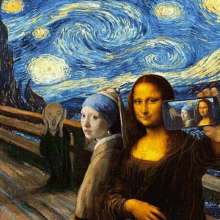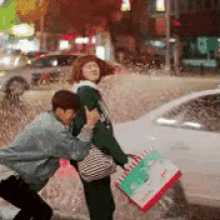The logic is simple: erase the words, erase the message, right? That’s the logic behind so much of 2020’s culture, the cancelling of celebrities, the new “code words” for fat or thin. Well... not really. The election of Trump for 2024 makes one thing clear: the approach liberals are using is not working, and it’s making people turn away.
I want to point this out- I’m a democrat, have been my entire life. I actually agree with most of the policies of the Blue Party. And that’s why, like many like minded people, I was really upset when Trump was voted for president.
“I don’t get it,” I told my dad. “Even if you were going to elect a rRepublican, why elect him?”

Image Credit: Aaron Burden from Unsplash
The point he made changed my entire understanding of politics. When you push something on someone, make it seem like there’s no other choice, they’re bound to go in the opposite direction. I think what happened is that by blaming caucasian males- the people with the power as well as the people in the majority of the population- they pushed away not only the ones willing and able to help their cause but also all the people that benefit from this system, all the women who benefit from being married to high status guys, all the people who don’t fit this profile that are favored by this system.
This also breeds the ability for people with privilege to victimize themselves, to view themselves as suppressed and lacking freedom of speech. This is what happened with Trump- the more “politically correct” people ridiculed Trump, the easier it was for Republicans to claim that they were being discriminated against and were lacking freedom of speech.
The idea of reverse racism is one that has been the foundation of many of Trump’s political goals- he consistently refuses contracts and bills he categorizes as “woke”, and vows to cut off spending for schools that talk about critical race theory.
Now is attacking someone as “woke” right or wrong? It’s not my place to say. But it is inevitably what’s going to happen when you make somebody feel as if their opinions are being judged and suppressed.
Like it or not, it’s human nature to cling to power. If a person is to give up that power, they want to be rewarded, or, at the very least, not feel compelled to “do more” or be attacked. Is this awful?
Yes. But unfortunately, it’s just how the brain works. As shown by the Zimbardo Prison Experiment, when someone is put into a position of authority, they immediately take on that role and begin to view themselves that way.
The issue is that social media claims to erase racism, sexism, and inequality without actually addressing a single underlying cause. Erasing words from our mental dictionary does nothing to change our perception of the word- it just makes us come up with more terms for it. But what it does do is create an illusion of social justice- lead people to believe that these problems are solved, and lead people to believe that the real world actually functions like the one on social media.
The problem is, it doesn’t.
I'm sure we all remember the infamous time Taylor Swift was bullied into deleting her Anti-Hero scene- the one in which she steps on a scale as her inner self calls her fat. "Fat shaming!" we cried. "Offensive!" But Swift's beliefs were a product of her time, representative of what her, and many people brought up in her era, were taught to believe. 66% of girls (National Organization for Women), want to be thinner, after all, and fat people are still commonly stereotyped as lazy or dumb.

Image Credit: Prateek Katyal from Unsplash
Even as online, any person who even mentions the color of a person’s skin is shamed, people at my school consistently use racial slurs, ableist language, and sexist remarks, without even thinking twice. Online, anti-LGBT practices would be immediately called out, and that’s good!
But it doesn’t change the fact that 53% of people don’t believe using someone’s preferred pronouns is important, and that 62% believe that male and female should be the only two official genders on documents (PRC and Forbes). Nor does it fix the fact that 60% of transgender peoples, 33% of queer people and 75% of black people have faced discrimination.
The biggest problem, though, is that cancel culture provides a means for people to silence someone without explaining why what they said was wrong. When you cancel an opinion, you try to shut it down quickly without acknowledging the opinion and explaining why it’s wrong. So many editorials and opinion articles rely on cancel culture to drive their message, rather than back it up with reasoning and facts. Vague, loose buzzwords like “racially insensitive” have no real meaning unless you explain why something is racially insensitive.
Bringing up extreme, rare, special-cases, for example rape in abortion cases, ignores the fact that exceptions can be found on both sides of the spectrum. Attacking the Republican political group itself (what do you mean it doesn’t fit the science? Republicans constantly ignore science!), misrepresenting arguments or only addressing insane ones, for instance, "women should not have to die for their children!" and so on do nothing to help your case.
And again and again in history, we have seen that silencing people only works against you in the long run. Catholicism ruled most of Europe during the Dark Ages- eventually a Protestant group sought to purify Christianity of Catholics altogether, and stigma surrounding Catholicism still exists today. Suppressing voices has constantly been factors in revolutions,
I wholeheartedly identify with the pro-choice movement. I think critical race theory is incredibly important! And that’s why I find it so offensive when people choose to misrepresent liberal ideals.
Sure, finding more positive LGBTQ+ content online and anti-diet messages helps us, but it isn’t fair to cancel anything that isn’t up to our modern standards of right and wrong. People forget that one of the main purposes of media is to be a reflection of the world we live in- even if it’s imperfect.






.jpeg)
.jpeg)






